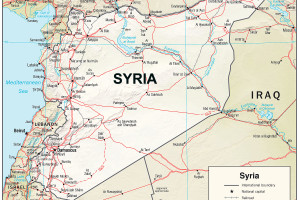Syria Opposition Says Russian Military Pullout Helps Peace Talks

(Bloomberg – bloomberg.com – Henry Meyer – March 15, 2016)
Syria’s main opposition group said Russia’s withdrawal of forces from the country will help peace talks in Geneva, even as a top Russian military official said that airstrikes will continue against terrorists.
The pullout ordered by Russian President Vladimir Putin is “a positive step which will help to move forward the negotiations,” Salem al-Muslet, chief spokesman for the Saudi-backed High Negotiations Committee, told reporters in Geneva on Tuesday. Syria’s opposition wants to see “actions on the ground” supporting Putin’s announcement, he said.
Su-34 bombers are among jets that have left the Khmeimim air base in Syria and troops are “loading equipment, logistics items and inventory into transport” planes, the Russian Defense Ministry said Tuesday on Twitter. Forces remaining in Syria are under orders to continue airstrikes against terrorists because it’s too early to talk about the defeat of terrorism, Russian Deputy Defense Minister Nikolai Pankov said at the base Tuesday, according to a ministry spokesman.
Putin, whose military intervention last year in support of Bashar al-Assad’s regime turned the tide in Syria’s five-year civil war, ordered the partial pullout on Monday. The surprise move puts pressure on the Syrian government and opposition groups to reach a peace deal at talks that resumed in Geneva on Monday. Russia has urged the Syrian leader to be “constructive” in the negotiations to end a conflict that’s killed a quarter-million people, sparked a refugee exodus to Europe and allowed Islamic State a foothold.
‘Serious Partner’
The HNC wants a “serious partner” at the talks, while Assad’s proposal for a national unity government means the “preservation of current rule,” al-Muslet said. The Syrian opposition insists on a transitional government as part of any agreement, he said.
Syria’s regime is indicating that it will only accept a limited role for the opposition in government, and that discussing Assad’s position is a “red line.” The opposition, backed by Saudi Arabia and Turkey, continues to insist that Assad must step down at the start of a transitional period.
Russia won’t ease up in its fight against terrorism and will leave air defenses in place including the S-400 anti-aircraft system to protect its remaining forces in Syria, Sergei Ivanov, head of the presidential administration, told reporters in Moscow on Tuesday.
Russia’s sorties in Syria have been reduced by two-thirds and it no longer needs a mission of this size, Kremlin spokesman Dmitry Peskov told reporters on a conference call Tuesday. The first jets returning from Syria landed at an airbase in Russia’s Voronezh region, state-run Rossiya 24 reported Tuesday.
Talks Impact
The Russian air base and a naval facility in Syria will continue to function, Putin said. Assad didn’t request the withdrawal, Peskov said late Monday.
The Russian leader’s announcement “is a significant development, which we hope will have a positive impact on the progress of the negotiations,” Staffan de Mistura, the United Nations’ special envoy for Syria, said in a statement Tuesday. De Mistura is due to have talks with the opposition Tuesday after holding his first meeting with the government delegation on Monday.
In ordering the pullback of the “main part” of Russia’s military from Syria, Putin said the armed forces’ “effective work” created the conditions for beginning the peace process. “I hope today’s decision will be a good signal to all the conflicting sides,” he said Monday.
For Putin, who’s worked with the U.S. to promote diplomacy in Syria even though the two powers backed opposite sides in the war, the withdrawal is an opportunity to display peacemaking credentials while preserving the gains Assad’s army made under Russian air cover.
‘Symbolic Gesture’
Putin and President Barack Obama discussed the Russian plan to remove forces by phone on Monday, the White House said. Obama welcomed the reduction in violence since the U.S. and Russia helped broker a truce last month, but said that “continuing offensive actions by Syrian regime forces risk undermining” both that truce and the Geneva talks.
The definition of who’s a terrorist in Syria, as well as Assad’s future role, has been at the root of the disagreement between Russia and the U.S., which says moderate rebels against the regime have also been targeted by Putin’s intervention. Russia says the opposition is dominated by jihadists. The current cease-fire allows operations against UN-designated terrorist groups to continue.
The U.S. has softened calls for Assad’s removal in recent months, while continuing to argue that a long-term settlement won’t be possible while he’s in office. In his phone call with Putin, Obama “underscored that a political transition is required to end the violence,” the White House said.
Putin’s announcement of a withdrawal is “a symbolic gesture to sweeten the opposition’s pill, because Assad is clearly not going to go away even if Russia slightly reduces its operations,” said Anton Lavrov, an independent Russian military analyst.
The Russian leader “is showing he’s a statesman,” said Joshua Landis, director of the Center for Middle East studies at the University of Oklahoma. “Russia is also sending a message to Assad who has been sounding too confident.”
Article ©2016 Bloomberg L.P. All Rights Reserved. Article also appeared at bloomberg.com/news/articles/2016-03-14/putin-orders-main-part-of-russian-army-to-start-syria-pullout-ilsa7fi5
